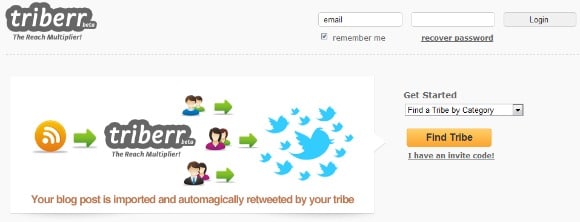 This is a guest post by Leo Widrich.
This is a guest post by Leo Widrich.
At the moment that I am writing this post the App I am working on is featured simultaneously on Social Media Examiner, ProBlogger and LaughingSquid, three massive Social Media sites that made the buzz go crazy.
It is fantastic.
Yet, as you are growing as a blogger, startup or other form of business I learnt that it is key for many reasons not to get carried away by these temporary viral successes.
What I found is that you drop all you are working on and start refreshing your site for more retweets, check Google Analytics for more hits or wait for more comments coming in. In fact you feel super busy doing all this. The only problem is, you don?t get anything done.
Now don?t get me wrong. I believe that celebrating and enjoying these moments is important.
Since these phases often pump me full with energy I think they are also a great point to get a big junk of work done. Here are my 5 top ways to keep your head down working, even though the buzz is going on. I also found that they make me very productive if there is no buzz happening.
1.) Tools
A straight forward way to keep yourself on the productive side when the online buzz increases is to use a few helpful tools. One I found to be very efficient is a fairly well known App called RescueTime. It allows you to set a timer, blocking certain website or internet usage overall.
If you want to consider a lighter option to stop yourself from refreshing Facebook or Twitter or any other sites for a few hours, I believe that Chrome Nanny or the Firefox equivalent Leech Block are awesome helpers in getting you focused.
2.) Pen & Paper
As we have all these great tweets about us being posted, I decided to simply switch back to pen and paper to brainstorm a few more blog posts.
It is a great way to get away from everything. As you are pumped and fully motivated in these moments, but don?t have the chance to stay focused online, just move it offline.
A few things which work very well for me are mindmapping, jotting down headlines and making lists of to do?s and ideas. In either option I found that simply shutting down my laptop helps me greatly to focus and use this energy productively.
3.) Time Batching
Another technique that worked very well for me in these situations is to batch times and tie them in with certain tasks.
Assign the time necessary to catch up with tweets, comments and emails to one point in time. I then go and have larger chunks of time where I focus on various tasks all lasting about 45 minutes. For the rest of the hour, I do all the tweeting and commenting. I clearly write the structure of these tasks down so I am not fooling myself.
Working in batches has increased my focus significantly as I am not paralysed by all the different things going on.
4.) Pulling The Plug
In case you can?t swap to pen and paper for various reasons, there is something else that helps me greatly. If the tools? mentioned in 1# don?t really keep you from uselessly observing the buzz, maybe pulling the plug helps.
Here I would literally pull the plug to my wireless router so there was absolutely no way I could get internet access. It left me with only my laptop and Word docs and I could finally start writing and focusing without switching back to emails or tweets.
5.) Single Service/Page Browsing
One last thing I tried many times successfully is to close all open browser tabs and only have a single window open.
Often I am too paralyzed and don?t know what to do with all the different places where I could get involved. By opening only one site at a time, it is much easier to focus on getting all tasks done that need to be done on that site. And then move on to the next one.
Over to you now. How do you manage yourself when there is buzz going on around your work? Do you believe that in the long run focusing on being productive is key? I would love your views on this below.
 About the author: Leo Widrich is the co-founder of Buffer, an app that allows you to schedule and customize your tweets throughout the day. You can read more on the Buffer blog, or follow Leo on Twitter at @LeoWid.
About the author: Leo Widrich is the co-founder of Buffer, an app that allows you to schedule and customize your tweets throughout the day. You can read more on the Buffer blog, or follow Leo on Twitter at @LeoWid.




 About the author: Neicole Crepeau is a speaker, blogger, columnist at
About the author: Neicole Crepeau is a speaker, blogger, columnist at 
 This is a guest post from Leon Noone.
This is a guest post from Leon Noone.


 About the Author: Dino Dogan is the founder of?
About the Author: Dino Dogan is the founder of?
